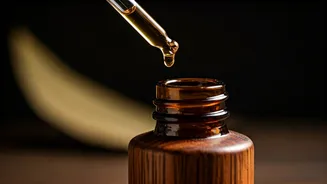Aggressive Massaging
One prevalent error is massaging the scalp too vigorously. While a gentle massage is beneficial, applying excessive pressure can cause harm. Aggressive
rubbing can lead to hair breakage, causing inflammation and potentially damaging hair follicles. Instead, use your fingertips to gently massage your scalp in circular motions. Focus on stimulating blood flow without causing strain. A soft, mindful touch is crucial to avoid any damage and get maximum benefits from the hair oil. Remember that the intention is to relax and nourish the scalp, not to scrub or irritate it. Using gentle pressure is key to promoting healthy hair growth.
Wrong Oil Choice
Another frequent mistake is using an inappropriate oil for your hair type. Different hair types have varying needs, and using the wrong oil can make the hair greasy, weigh it down, or fail to provide adequate hydration. For instance, individuals with fine hair may find heavy oils like castor oil too heavy, causing a flat appearance. Instead, opt for lighter oils such as argan or jojoba oil, which absorb easily without adding weight. Conversely, those with coarse or dry hair may benefit from richer oils like coconut or olive oil, which can provide deep moisturization. Understanding your hair's specific requirements is crucial for selecting the ideal oil and achieving desired results.
Scalp Issues Ignored
Ignoring underlying scalp issues is another common oversight. Conditions like dandruff, seborrheic dermatitis, or psoriasis can be exacerbated by incorrect oiling practices. Applying oil to an unhealthy scalp can trap irritants and make these issues worse. If you have any scalp concerns, it’s best to address them before oiling. Use a medicated shampoo or consult a dermatologist to treat the underlying issues. Once the scalp is healthy, you can resume oiling with the right approach. Focusing on scalp health ensures that your hair gets the best environment for growth.
Overnight Oiling Habit
Leaving oil on your hair overnight is often considered a standard practice, but it's not always beneficial. While some people find that overnight oiling deeply conditions their hair, it can also lead to issues like clogged pores, especially if you have an oily scalp. The oil can attract dust and grime, potentially causing buildup. Consider leaving the oil on for a few hours instead. This allows the oil to penetrate the hair shaft without risking adverse effects. Always tailor the duration of oiling to your hair type and the oil used. This practice helps to maximize the benefits without the drawbacks.
Applying Too Much
Applying excessive oil is a frequent mistake that often leaves the hair feeling heavy and greasy. More oil does not necessarily equate to better results. Instead, it can make your hair look limp and difficult to manage. Start with a small amount of oil, especially if your hair is fine or prone to oiliness. Add more only if needed. Distribute the oil evenly from roots to tips, focusing on the ends, which tend to be drier. This ensures that your hair gets the benefits of oiling without the unwanted effect of excess product. Moderation is key to achieving that healthy shine.












